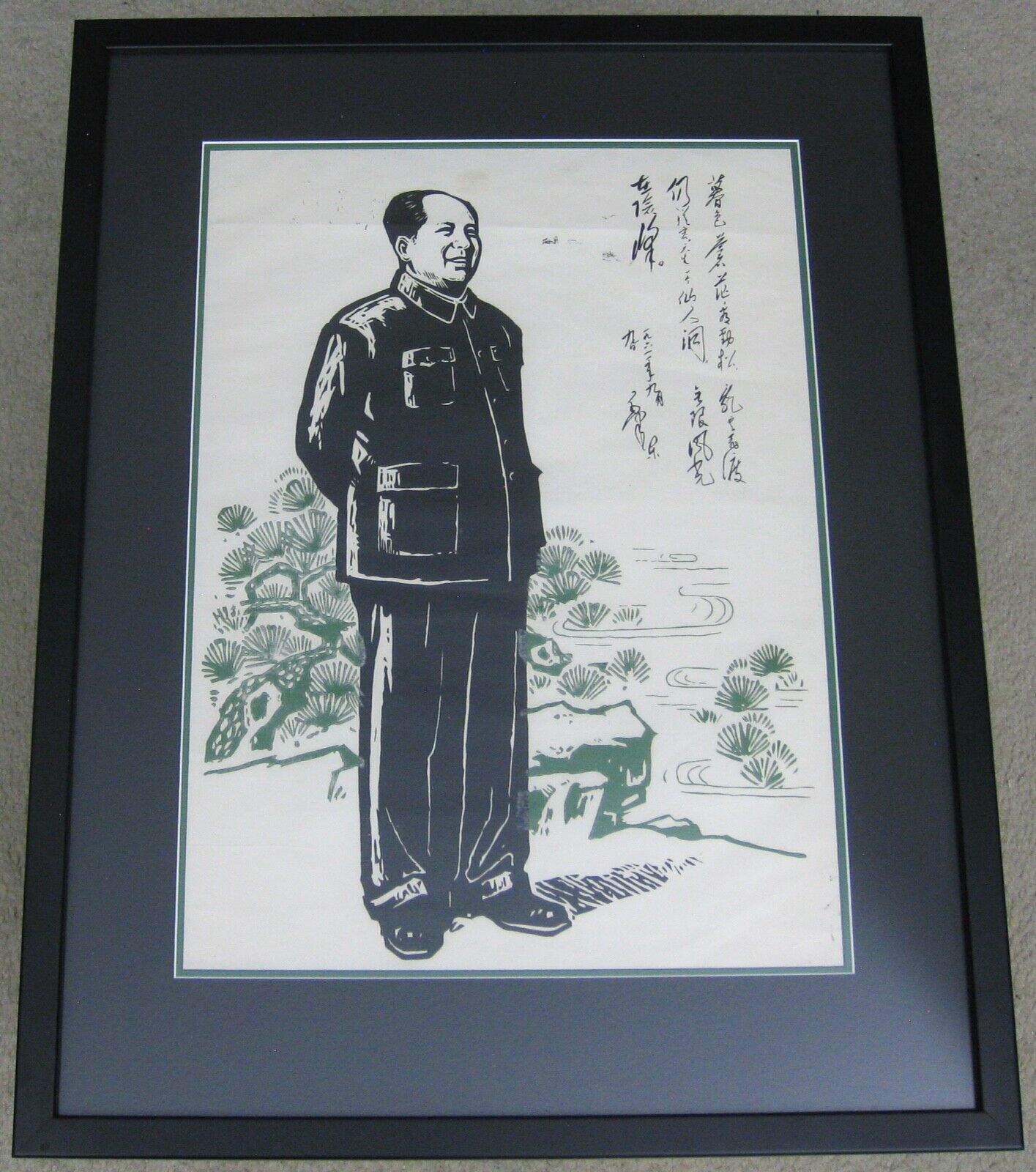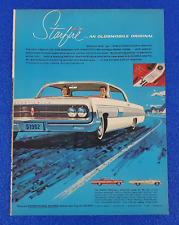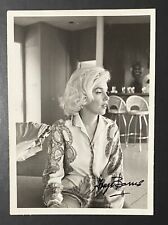When you click on links to various merchants on this site and make a purchase, this can result in this site earning a commission. Affiliate programs and affiliations include, but are not limited to, the eBay Partner Network.
Original 1962 Chairman Mao Print from the Great Leap Forward Era
This listing is for an original 1962 print of Chairman Mao Zedong with handmade Chinese calligraphy that combines unique visual art and literary interpretation of meaning. The poster has been professionally framed and is 26.25 inches x 20.5 inches.
The poem in the print is from Mao Zedong's "Seven Absolute Photos of Lushan Immortal Cave Taken by Comrade Li Jin”. It was originally written on September 9, 1961.
Amid the growing shades of dusk stand sturdy pines,
Riotous clouds sweep past, swift and tranquil.
Nature has excelled herself in the Fairy Cave,
On perilous peaks dwells beauty in her infinite variety.
Creation background: The day the poem was written was the thirty-fourth anniversary of the "Autumn Harvest Uprising", which Mao was proud of. Although the author has a desolate element in his heart at this time, it is more the tenacity and confidence in the author's character and the fighting spirit that is not afraid of pressure.
Although the poem seems to describe the scenery, but it actually contains a deep philosophical meaning. On the one hand, it warns us that no matter what kind of adversity we are in, we must maintain a calm posture, and we must not be afraid and unwavering in the face of danger. On the other hand, it also guides us to have certain beliefs about our goals and dare to climb dangerous peaks, because victory is never easy, and it can only be achieved after countless trials and unremitting efforts.
1962
What was happening in China in 1962
The Great Leap Forward
This poster was created at the very end of the Great Leap Forward era which continued from 1958 to 1962. Chairman Mao launched the campaign to move China from an agrarian economy
into a communist society through the formation of people’s communes. Mao expected that by creating these large communes the grain yields would increase significantly and imposed pressure on the local officials to meet his unrealistic goals. The local officials fearful of being labeled as “rightists” or wanting to impress their superiors provided exaggerated production numbers. The central government used these numbers, which sometimes were as much as 10X higher than the actual production, to calculate how much to ship to the cities and how much to remain in the commune. The farmers ended up having very little grain which caused massive starvation in the rural areas. Also, the actual overall production decreased due to mismanagement of the communes and the Four Pests campaign. Estimates were difficult to accurately assess but estimates range from 15 to 55 million Chinese died of starvation.
The Four Pests Campaign
The Four Pests campaign (1958 to 1962) was to eliminate rats, flies, mosquitoes and sparrows. The reasoning behind the campaign was to eradicate the pests responsible for the transmission of pestilence and disease and increase grain production. Eliminating the sparrows that ate the grain, seed and fruit was expected to contribute to a larger harvest. The actual result was a severe ecological imbalance and nearly pushed the sparrow population into extinction in China. The sparrows did eat some grain but they also ate insects and they kept the insect population at a manageable level. The insect population exploded and the grain harvest decreased. In 1960 the campaign against the sparrows was ended and redirected to bed bugs.
Backyard Steel Furnaces
Mao saw grain and steel production as he key pillars of economic development. Mao had no knowledge of metallurgy and encourage the establishment of small backyard steel furnaces in every commune and each urban neighborhood.
Huge efforts on the part of illiterate peasants and other workers were made to produce steel out of scrap metal. To fuel the furnaces, the local environment was denuded of trees and wood taken from the doors and furniture of peasants' houses. Pots, pans, and other metal artifacts were requisitioned to supply the "scrap" for the furnaces so that the wildly optimistic production targets could be met.
Although the output consisted of low quality lumps of pig iron which was of negligible economic worth, Mao had a deep distrust of intellectuals, engineers and technicians who could have pointed this out and instead placed his faith in the power of the mass mobilization of the peasants.
Broken Russian Relations
In late 1962, the PRC broke relations with the USSR because Khrushchev did not go to war with the U.S. over the Cuban Missile Crisis. Regarding that Soviet loss-of-face, Mao said that "Khrushchev has moved from adventurism to capitulationism" with a negotiated, bilateral, military stand-down. Khrushchev replied that Mao's belligerent foreign policies would lead to an East–West nuclear war. Surprisingly, Khrushchev was removed from office in 1964 while Mao stayed in power until his death in 1976.
The deteriorating political relations between the People's Republic of China and the Soviet Union had been intensifying since the late 1950’s due to different interpretations of practical applications of Marxism-Leninism. The specific disputes were about Khrushchev’s policies of national de-Stalinization and international peaceful coexistence with the Western Bloc, which Chairman Mao decried as revisionism. China took a belligerent stance towards the Western world, and publicly rejected the Soviet Union's policy of peaceful coexistence between the West. The PRC formally denounced Soviet communism as the work of "revisionist traitors" and declared the Soviet Union to be social imperialist.
After Chairman Mao broke relations with the Soviet Union, Nikita Khrushchev ordered the return of all the Russian advisors, engineers and scientist that were assisting in the industrialization of China. Even those Russians that wanted to stay were forced to leave and take any equip that they could carry. This loss of the Soviet engineering and technical assistance set back the Chinese economy for many years.
The Cultural Revolution
The disastrous Great Leap Forward, the loss of the Soviet assistance and technology and the massive loss of life due to starvation caused Chairman Mao to loose some public respect and weaken his political support. To counter his popular decline and assume total political control he began planning for his next campaign: the Cultural Revolution, which would start in 1966 and continue until his death in 1976.






